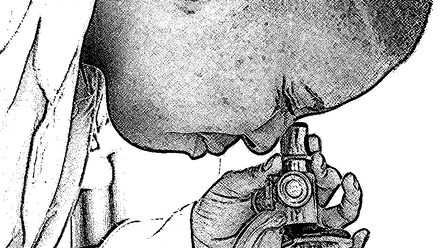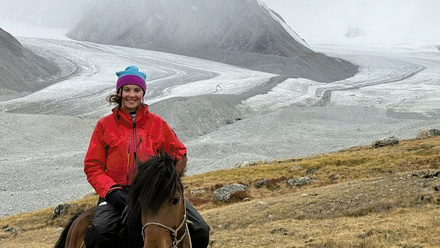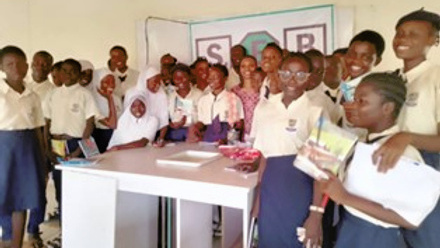Travel Grants to Go: A worldwide #SEBparty! - Full version
This is the full version of the "A worldwide #SEBparty!" article published in the
SEB Magazine Autumn 2023 (pages 42-44).
2023 is a special year marking the 100 years of SEB. To celebrate this achievement, we sponsored ten successful applicants with the SEB Birthday Grant to organise a celebration event at their own institutions. Each awardee received up to £500 to assist with the independent organisation of a scientific meeting, networking event, single lecture, or small events such as postgraduate research days. Events that were cross-institutional and regional, and student-focused were looked upon more favourably.
We had celebrations happening in eight different countries: Australia, Belgium, Canada, Denmark, England, Israel, Italy, and Nigeria. Here is an overview of what happened and reflections on the events.

Figure 1. The #SEBparty! was an international affair, with celebrations in eight countries: Australia, Belgium, Canada, Denmark, England, Israel, Italy, and Nigeria.
Australia
Celebrating the past, present and future of experimental biology in Western Australia
Dr Daniel Gomez Isaza and Dr Essie Rodgers organised a networking and seminar series with talks from early, mid and late-career researchers from three different institutions in Western Australia. Aiming to foster collaboration and increase networking and knowledge exchange in experimental biology, the event brought together undergraduate and graduate students, early career researchers and academics from across various institutions.
Six invited speakers, including the early careers, Dr Daniel Gomez Isaza (Murdoch University), Isobel Sewell (University of Western Australia) and Jake Daviot (Murdoch University); mid-careers, Dr Essie Rodgers (Murdoch University) and Dr Christine Cooper (Curtin University); and senior scientist, Prof Nicki Mitchell (University of Western Australia), shared their research covering a range of topics in animal biology, respectively:
- responses of ectothermic species to thermal variation,
- the use of insect protein in aquaculture diets,
- the importance of Carter's freshwater mussel in maintaining and improving water quality.
- a showcase of the promise of using physiology to conserve the world’s biodiversity.
- insights into the unique thermal and hygric physiology of strange Australian marsupials.
- the weirdly fascinating reproductive physiology and behaviour of the turtle frog (organisers suggest “you Google this ugly-beautiful frog”).
The talks echoed the aims of the SEB by highlighting the importance and impact of biological research on tackling real-world issues such as climate change, food security and conservation efforts. At the end, a social reception with food, drink and even a special SEB birthday cake allowed attendees to connect and celebrate.
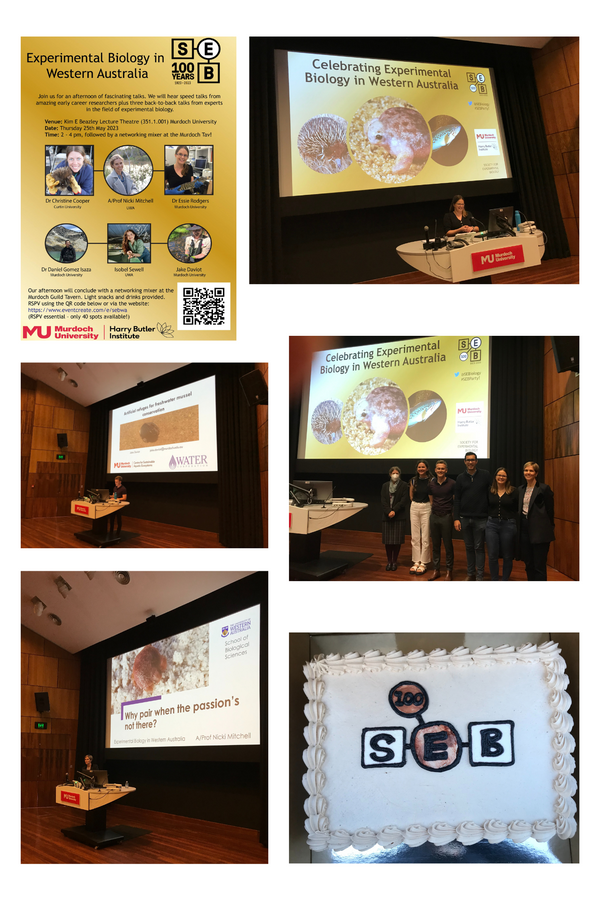
Belgium
On Life in Academia
“On Life in Academia” gathered 97 attendees, including 77 undergraduates and postgraduates in biology from six different Belgian universities. The event, organised by Dr Simon Baeckens, aimed to bring a more contemporary view on life in academia, focusing on the importance of collaboration, healthy work-life balance, science communication and how biological research is made of successes and failures. The keynote speaker was Dr Richard Shine, an evolutionary biologist at Macquarie University, who has achieved academic excellence and was invited to reflect on his lifelong career.
His talk “A life in science, as seen in the rear-view mirror of an increasingly slow-moving vehicle” highlighted the need to be flexible and embrace opportunities and that luck plays an important role. He also talked about his passion for evolution and ecology, why it is important to invest in science communication, and working family-friendly hours as well as working together in a diverse team. After the talk, his spouse Terri provided her perspectives and views on the influence of academia on family life and how they dealt with challenges. The Question and Answer session was coordinated by Prof Hans Van Dyck, and at the end, attendees were able to interact during a reception.

Lectures in Experimental Vertebrate Palaeontology Master’s Course
Dr Jamie MacLaren organised five weeks of lectures on experimental vertebrate palaeontology for a Master's course at the University of Antwerpen, Belgium, to inspire the next generation of researchers to pursue careers in experimental biology and get up to date with the most recent research in the field. In February, two invited speakers, Dr Gabriel Ferreira and Dr Peter Falkingham talked about “Turtle Evolution” and “(Vertebrate) Palaeoichnology”, respectively.
At the beginning of March, the talks were bird-focused, with Oliver Demuth talking about “Evolution of Avian Flight” and Prof Matthew Shawkey presenting about “Color in the Fossil Record”. Still, in March, the students had the opportunity to hear about musculoskeletal 3D modelling with Prof John Nyakatura exploring the locomotion in the stem amniote Orobates and Dr Verónica Díez Díaz discussing tail mobility and function in Sauropodomorpha.
The second part of the lectures continued with a biomechanic focus, with Dr Hazel Richards presenting about “Australian Megafauna”, Prof Alexandra Houssaye talking about “Microanatomical and histological specialisations in relation to functional constraints”, Dr Liz Martin-Silverstone talking about “Biomechanics of Pterosaurs” and to wrapping up Narimane Chatar discussed “Sabre-toothed carnivorans”.
Canada
Biology/Environmental Science undergraduate thesis colloquium
The SEB Birthday Grant funding that Dr Christine Madliger and Dr Jennifer Foote received was put toward travel and accommodation costs for a speaker at our Biology/Environmental Science undergraduate thesis colloquium at Algoma University, Ontario, Canada. They hosted Dr. Brent Sinclair (Western University, Ontario, Canada), who gave a keynote talk titled “Exploring the mechanisms underlying insect freeze tolerance in Gryllus veletis”. Dr. Sinclair’s presentation covered his diverse experimental work focused on assessing the freeze tolerance of insects and was attended by undergraduate students, faculty members from our Biology and Psychology departments, university administrators, and community members. Given that Algoma University is an entirely undergraduate university that is comparatively geographically isolated from other Ontario institutions, this presentation offered a unique opportunity to expose undergraduate students to experimental biology research outside of their own university.
Dr. Sinclair spent time answering questions and discussing his research with students and community members, and he was an active participant in the question periods after the undergraduate students presented their final thesis projects. The session also provided an opportunity to share the background of the Society for Experimental Biology and the purpose of the Birthday Grant funding with audience members. Overall, Dr. Sinclair’s participation in the full day of thesis activities greatly enriched the experience of our undergraduate students and expanded their knowledge of experimental biology research.
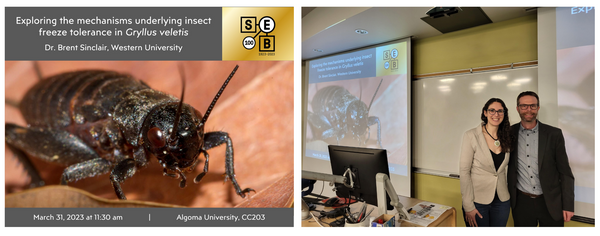
Denmark
International Conference to Celebrate 50th Anniversary of Aarhus University’s Danish Zoophysiology Group
The celebration of the 50th anniversary of Aarhus University’s Danish Zoophysiology Group was organised to bring comparative physiologist experts to discuss state-of-the-art research in the field. 75 participants from 36 universities attended the meeting, ranging from PhD students to emeritus professors.
To support the attendance of early career researchers at the International Conference to celebrate the 50th anniversary of the Zoophysiology department in Aarhus, Dr Christian Damsgaard and Prof Tobias Wang were able to use the SEB Birthday Grant to reduce the registration fee to five attendees. The meeting and accommodation were onsite at Sandbjerg Manor House, which enabled attendees to foster interdisciplinary collaborations and allowed interesting discussions and interactions which is expected to drive the comparative physiology field forward and lead to the next future breakthroughs in the field.
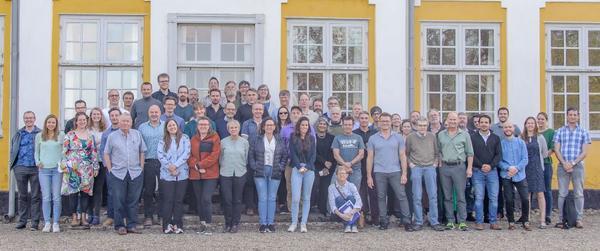
England
Poster and networking session for the UK Cereals Research Community
Dr Philippa Borrill and Dr Paola Tosi organised a poster and networking session during the first evening of the Monogram Network Annual Meeting, which is an event that connects academic and industry scientists working on cereal crop research and breeding across the UK and beyond. Over 40 early career scientists presented their posters for the Conference attendees with the opportunity to discuss their research and how it might apply to the industry and learn about career options in plant breeding.
The research presented included topics ranging from in-field phenotyping, to genetics, to the latest genomic analyses in complex polyploid species like wheat. In-depth conversations occurred about research projects ranging from rapidly evolving disease resistance to improving the nutritional value of staple crops.
The combination of the SEB celebratory event with a major Conference at the University of Reading brought together students, postdocs and early-career scientists from different institutions and fostered discussions fuelled with pizza. As highlighted by the organisers, one successful characteristic of the event was building bridges between academia and industry.
Celebrating Plant Science: An Early Career Scientist Event
To enable connections between early career scientists, especially after disruptive years due to the pandemic, support their career development and promote SEB offerings, Dr Amanda Cavanagh, together with Dr Tracy Lawson and Dr Pallavi Singh, organised the “Celebrating Plant Science” event at the University of Essex.
Among the 40 participants, there were postdocs and students from nine UK institutions and one European University. The event had a keynote talk by Prof Susanne von Caemmerer, a poster and a networking session where 18 participants presented their research, and a career discussion panel where Prof Susanne together with Dr Andy Simkin, the current SEB President Prof Tracy Lawson and former SEB President Prof Christine Raines shared their experience and gave career advice to the attendees. The event fostered discussions among early careers and established researchers, breaking barriers of relationships and hierarchies. It also expanded the reach of SEB to new research cohorts.

Israel
Department of Postharvest Sciences Event
Dr Simon Michaeli organised an integrative and informal event for the Department of Postharvest Sciences at the Volcani Institute in Israel with the aim to bring scientists from the department together and spread the word about the SEB as a learned society.
After explaining the role of a scientific society and presenting about the SEB, Dr Simon invited four department members to give outdoor chalk talks about their laboratories and research. A food and drink reception to close the event allowed attendees and labs to interact, an opportunity that has been lacking in recent years.

Italy
From elements of historical and STEM experimental bioscience to modern interdisciplinary environmental education
The event “From elements of historical and STEM experimental bioscience to modern interdisciplinary environmental education”, organised by Marina B. A. Minoli, FRSB CSciTeach Professor, aimed to highlight and give examples of how inquiry-based science education (IBSE) methodologies and interdisciplinarity can contribute to promoting interest and passion for Biosciences. Organised as an online two-session, the event was featured in different scientific channels, approved by the Royal Society of Biology for 12 CPD (Continuing Professional Development) points, and achieved attendance and engagement expectations.
Marina discussed the importance and advantages of teaching environmental science based on different integrated science and plant science approaches, exemplifying how environmental research and historical bioscience evolution can contribute to science engagement and promote critical thinking; the two invited speakers, Alex Costa and E. Dell’Aglio, showed how different innovative experimental plant physiology analysis can promote interest for bioscience. As a result, the event brought an integrated overview of different ideas and projects of the past and present, promoting innovative and reasoned environmental education with interesting elements of modern experimental bioscience studies. Some ideas and contents presented and discussed in Marina BA Minoli’s talks are presented in this published article: Marina B.A. Minoli, “STEM Environmental Education: a training itinerary for the 100th SEB anniversary 2023 ”, Emmeciquadro n. 85, 10/2023.
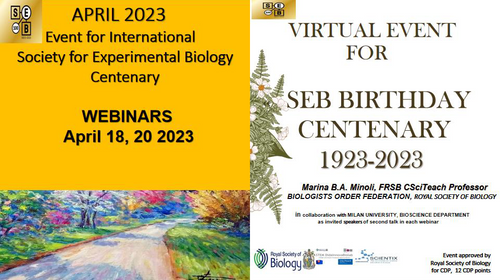
Nigeria
The Making of a Scientist: An Event for the Department of Pure and Applied Zoology Students
Around 100 graduate students and final-year undergraduate students of the Department of Pure and Applied Zoology, at the College of Biosciences at the Federal University of Agriculture in Abeokuta, Nigeria, joined “The Making of a Scientist” event. The keynote speaker, Professor A. Babatunde Idowu, who is the first professor of the department and the current Vice Chancellor of Glorious Vision University in Ogwa, Edo State, talked about how to become a successful scientist, particularly in experimental biology.
The students were highly engaged and asked many questions addressed by Prof A. B. Idowu and other department lectures, including the Head of the Department, Prof O. A. Idowu; the Deputy Dean of the College, Prof K. O. Ademolu; Prof D. A. Dedeke (also a SEB member); Dr A. A. Adedeshide; and Mr J Jonathan. Dr David Audu, the event organiser, also gave a talk on how to become a member and the benefits of joining a scientific society such as the SEB. After the talks, a drink and snack reception allowed attendees to interact.

Have a look at some #SEBparty on social media:
https://x.com/_danielgomez94/status/1661698192424210432?s=20
https://x.com/palaeotheoryum/status/1673614797328334848?s=20
https://x.com/Michaeli_Lab/status/1654082222851325954?s=20
https://x.com/AuduDav/status/1651937510354825216?s=20
Are you looking for funding to support your project or event?
Check out the Grants and Funding available.
*Thanks to the organiser for providing feedback for this article.

